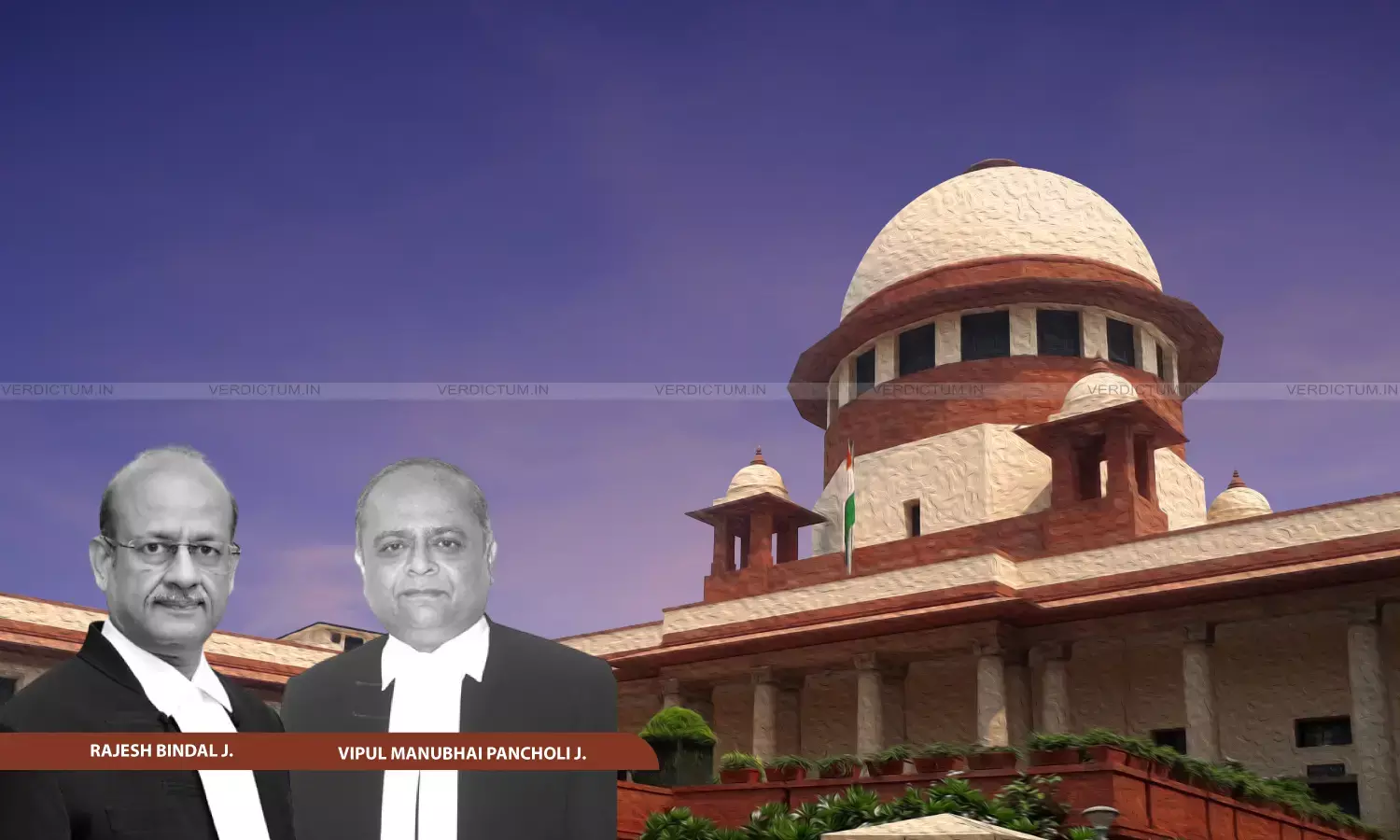Dying Declaration Can’t Be Ignored Merely Because Of Minor Discrepancies In Prosecution Witness’s Version With Regard To Such Declaration: Supreme Court
The appeal before the Supreme Court was directed against the final order of the Gujarat High Court convicting the appellant/accused for committing the offence punishable under Section 302 of the IPC.

Justice Rajesh Bindal, Justice Vipul M. Pancholi, Supreme Court
While upholding the conviction of a woman in an alleged case of murder, the Supreme Court has held that merely because there are minor discrepancies in the version given by the prosecution witness with regard to the dying declaration and with regard to the manner of occurrence of the incident, the dying declaration given by the deceased before the independent witness cannot be ignored.
The appeal before the Apex Court was directed against the final order of the Gujarat High Court convicting the appellant/accused for committing the offence punishable under Section 302 of the Indian Penal Code, 1860 (IPC) and sentencing him to imprisonment for life.
The Division Bench of Justice Rajesh Bindal and Justice Vipul M. Pancholi held, “We are of the view that merely because there are minor discrepancies in the version given by the prosecution witness with regard to the dying declaration and with regard to the manner of occurrence of the incident, the first dying declaration given by the deceased before the independent witness, i.e PW-3, cannot be ignored. The first dying declaration is supported by the independent documentary evidence, and therefore, the High Court has rightly placed reliance upon the decision rendered by this Court in the case of Nallam Veera Stayanandam & Ors. v. Public Prosecutor, High Court of A.P., (2004) 10 SCC 769 and thereby, rightly set aside the order of acquittal rendered by the trial court qua the appellant/accused.
AOR S. C. Birla represented the Appellant, while AOR Swati Ghildiyal represented the Respondent.
Factual Background
The case as set up by the prosecution was that the appellant/accused and the co-accused entered into a criminal conspiracy to kill one Leelaben and her son Ganesh. It was alleged that when Leelaben and her son were sleeping in their hut, the appellant/accused poured kerosene upon Leelaben and set her ablaze. Leelaben succumbed to the injuries, and her son received burn injuries to the extent of 10 to 12%. The complaint was filed by PW-1, sister of Leelaben and charges were framed for offences punishable under Sections 302, 307, 436, 34, 120 (b) of the IPC and Section 135 of the Bombay Police Act,1951.
The Trial Court acquitted both the accused persons on the ground that there were discrepancies in three dying declarations given by Leelaben, the deceased. The High Court later convicted the appellant/accused of committing the offence punishable under Section 302 of the IPC. Aggrieved thereby, the appellant approached the Apex Court.
Reasoning
On a perusal of the facts of the case, the Bench noted that when the deceased was brought to the hospital, she narrated the incident before the Doctor (PW-3). As per the Doctor, the deceased specifically narrated that the appellant/accused, her aunt-in-law, set her ablaze. It was also specifically stated by the Doctor that the patient was conscious and she was in a position to speak. Therefore, a police officer was asked to make arrangements for recording the dying declaration of the deceased. It was further observed that the Medical Certificate of the deceased also stated that the “whole body and clothing had kerosene-smelling burns about 100%.”
Referring to the panchnama, the Bench noted that the investigating agency found “one empty container having kerosene smell” from the place of the incident. Similarly, the soil of the surface of the hut (the place of incident) had the smell of kerosene, and the aforesaid document also corroborated the version given by the deceased before the independent witness, the Doctor.
The doctor had also deposed before the Court that the son of the deceased, aged about 4 years, sustained 10-12% burn injuries on his lower legs and feet. “Thus, from the aforesaid evidence led by the prosecution, it is revealed that the dying declaration given by the deceased before the Doctor is supported by other evidence led by the prosecution”, it added.
Holding that the High Court rightly set aside the order of the trial court, the Bench dismissed the appeal.
Cause Title: Jemaben v. The State of Gujarat (Neutral Citation: 2025 INSC 1268)
Appearance
Appellant: AOR S. C. Birla, Advocate Subrat Birla
Respondent: AOR Swati Ghildiyal, Advocate Rishi Yadav

